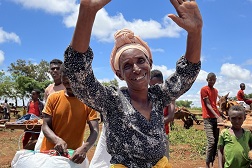Health facilities in Ethiopia lack supplies amid ongoing violence, while civilians struggle to rebuild livelihoods and recover from the two year’s long devastating civil war in Northern Ethiopia, says the International Committee of the Red Cross (ICRC).
Northern regions of Ethiopia struggle to recover from the devastating legacy of the two-year armed conflict that gripped the country between November 2020 and November 2022. Efforts to rebuild livelihoods have been hampered by unexploded ordnance, difficult economic recovery, and severe drought. At the same time, conflicts in Amhara and Oromia continue disrupting lives. “People affected by conflict face enormous challenges to meet their needs.” said Nicolas Von Arx, the head of the ICRC delegation in Addis Ababa.
“We are particularly concerned about the protection of the lives, property and livelihoods of civilians. We therefore maintain a regular dialogue with military, security forces and armed groups to promote respect for international humanitarian law, which should mitigate the effects of the fighting on civilians.” he added.
In 2023, the International Committee of the Red Cross (ICRC) helped treat weapon-wounded patients in Ethiopian health facilities it supports. Most of the patients were wounded during armed clashes while others got injured by unexploded ordnance in the northern regions.
Those who lost limbs received physiotherapy and mobility devices. In Amhara and Oromia health facilities struggle to assist the wounded and the sick, after supply chains were disrupted by insecurity and movement restrictions.
At the same time, Tigray, Amhara, Afar and Somali Regional State are facing serious food shortages. Scarcity of food and lack of clean water affect the most vulnerable, especially pregnant women and young children.
Since April last year, the ICRC has been providing nutrition services in 29 health posts in remote areas of the Tigray region to treat children under five, as well as pregnant and lactating women suffering from acute malnutrition. It continues working with the Ethiopian Red Cross Society (ERCS) to help people affected by conflict and violence throughout the country. This support includes improving access to health services and clean water, and helping people rebuild their livelihoods. The ICRC supported 33 ERCS branches with operational costs of their ambulance services last year.
In 2023 the ICRC, working together with the ERCS, has assisted nearly 146,000 people who received cash assistance to meet their basic needs, 130,000 received household items, and 135,000 received food, while over two million livestock were vaccinated to secure the livelihoods of people in affected areas.

